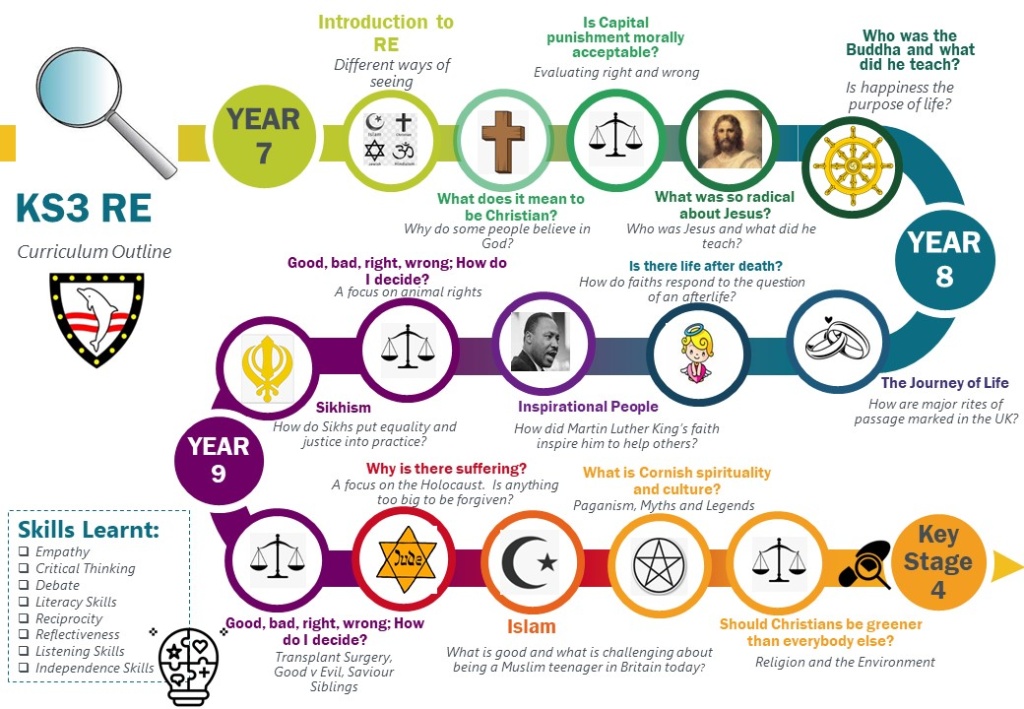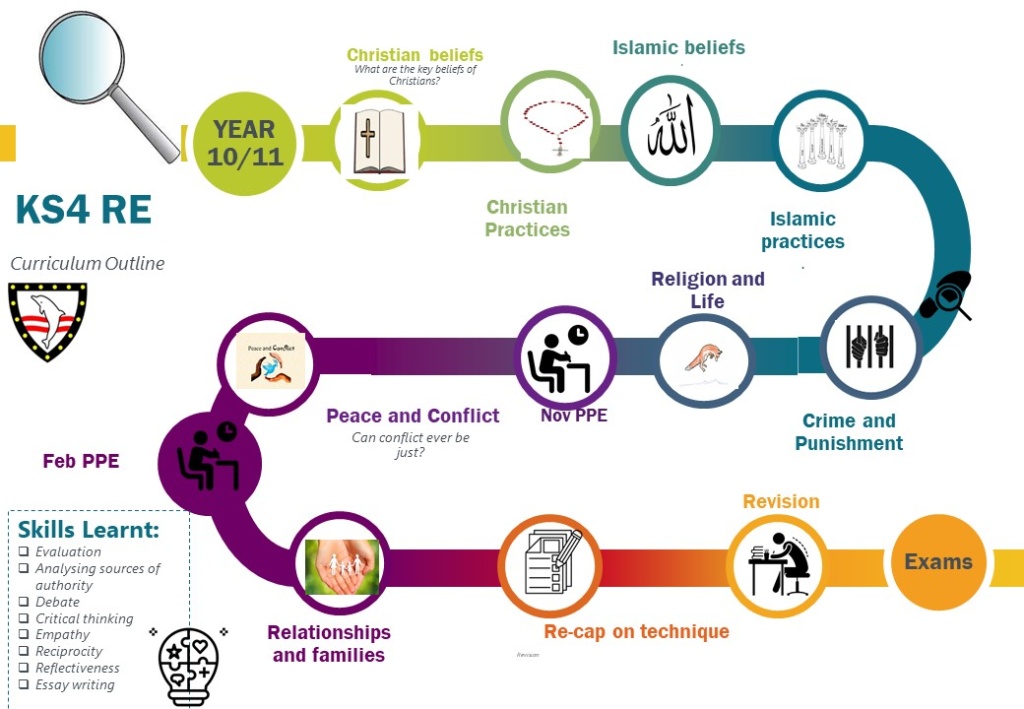Religious Education
Religious Education provokes challenging questions about ultimate meaning and purpose of life, beliefs about God and religion, issues of right and wrong and what it means to be human. It encourages students to learn from different religions, beliefs, values and traditions while exploring their own beliefs and questions of meaning.
Within the curriculum, students will be encouraged to develop skills of investigation, interpretation, reflection, empathy and evaluation alongside analysis, synthesis and expression. We don’t force belief on students; instead we give them the space to consider their own responses to the different belief systems they will study. Students will also have access, through their lessons, to a range of guest speakers from different faith communities, who will help to bring the curriculum alive from a personal perspective.
Religious Education is taught across all year groups, as per the requirements of the National Curriculum and Cornwall Agreed Syllabus for Religious Education.
All our schemes of learning are based upon the Cornwall Agreed Syllabus for education 2020-2025. We seek to provide an innovative and rigorous approach that will promote a high standard of RE within our school.
Religious education contributes dynamically to children and young people’s education in schools by provoking challenging questions about meaning and purpose in life, beliefs about God, ultimate reality, issues of right and wrong and what it means to be human.
In RE students learn about religions and beliefs in local, national and global contexts, to discover, explore and consider different answers to these questions.
Students learn to weigh up the value of wisdom from different sources, to develop and express their insights in response and to agree or disagree respectfully.
The Cornwall Agreed Syllabus’ principle aim is to explore what people believe and what difference this makes to how they live, so that students gain the knowledge, understanding and skills needed to handle questions raised by religion and belief, reflecting on their own ideas and ways of living.
Skills we foster: Empathy, critical thinking, debate, essay writing, reciprocity and reflectiveness.
Withdrawal from RE
Parental right of withdrawal from RE was first granted in 1944 when curricular RE was called ‘Religious Instruction’ and, as such, had connotations of induction into the Christian faith.
RE is very different now. It takes account of world faiths and non-religious world views so that children can learn about and from religious traditions without being inducted into those traditions.
In the UK, 70+ years later, parents still have the right to withdraw their children from RE on the grounds that they wish to provide their own RE. This RE provision will be the parents’ responsibility. This right of withdrawal exists for all pupils in all types of school, including schools that do and do not have a religious designation. Students who are aged 18 or over also have the right to withdraw themselves from RE.
At Richard Lander School, we have not had a single withdrawal for many years and usually a conversation with the Head of Department and an explanation of what we do, and why, reassures parents/carers that we teach and not preach; there is no hidden agenda.
Geography is about the world around us, History is about the lives of people before and RE is principally a study of people and their beliefs. This is how and why RE sits within the Humanities faculty; to give students a holistic understanding of the world in which we live.
Year 7
An Introduction to RE
What does it mean for Christians to believe in God as Trinity? Does God have limitations?
What is so radical about Jesus?
Is happiness the purpose of Life?
Who was The Buddha and what did he teach?
Natre Spirited Arts competition
Year 8
What is meant by, the journey of life?
Why don’t Hindus want to be reincarnated and what can they do about it?
How far does it make a difference if you believe in life after death?
Does the world need prophets today?
How are Sikh teachings on equality and service put into practice today?
Good, bad, right wrong; how do I decide? (Focus on animal rights)
Spirited Arts competition
Year 9
Good, bad, right, wrong: How do I decide? Continued. How do we make moral decisions and what are they based on? A focus on medical ethics; Should Christians be greener than everyone else?
Why is there suffering? Are there any good solutions? A focus on Holocaust Memorial Day resources
What is good and what is challenging about being a Muslim teenager in Britain today?
What is Cornish spirituality and culture?
A curriculum overview for Years 7-11 Religious Education is available here
If you have any further questions please contact Mrs V Downing – Head of RE / PD
Students who have opted to take the Full Course GCSE follow AQA exam board, specification A route A, Christianity and Islam.
Year 10 – Within this year we cover: Christian beliefs, Christian practices, Islamic beliefs, Islamic practices.
This will be all the subject knowledge for paper 1 of the exam. We conclude the year by starting on one of the four themes required for paper two; Relationships and families.
Year 11 – We cover the final three themes; Crime and punishment, Peace and conflict, Religion and Life. We then revise and make ready for the GCSE exam with lots of revision.
All students not taking the GCSE qualification have a legal entitlement to Religious Education. Details of this can be found on the Personal Development page of the web-site as both subjects are combined into a non-examined course in religion, ethics and personal development
Visiting guest speakers have a valuable input into the curriculum, sharing their personal perspective on matters of faith and religion.
For the AQA Religious Studies exam specification please click here
A curriculum overview for Years 7-11 Religious Education is available here
If you have any further questions please contact Mrs V Downing – Head of RE / PD

